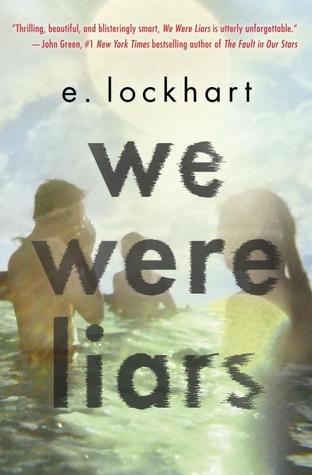I knew literally nothing about E. Lockhart’s WE WERE LIARS when I settled down to read. It’s better when you know nothing, is the phrase that was repeated to me by friend after friend. But they all insisted that I simply must read it, and that when I had, we would DISCUSS, but no, they would not tell me what it was about.
I was intrigued, so I read.
They were not wrong. It’s better when you know nothing.
That said, I need to write a review. This may be tricky.
The Plot (from Goodreads):
A beautiful and distinguished family.
A private island.
A brilliant, damaged girl; a passionate, political boy.
A group of four friends—the Liars—whose friendship turns destructive.
A revolution. An accident. A secret.
Lies upon lies.
True love.
The truth.
We Were Liars is a modern, sophisticated suspense novel from National Book Award finalist and Printz Award honoree E. Lockhart.
Read it.
And if anyone asks you how it ends, just LIE.
My Thoughts:
Obviously, the summary gives you very little to go on to decide if you want to read this book. For me, it worked for friends to shove it into my hands saying, you will like this. But that’s because they know my taste. You probably need a little more to go on, because I actually don’t believe this book is for everyone.
So here’s the most non-spoilery summary I can give:
WE WERE LIARS is about a group of four teens (three cousins, one friend) who grow up spending their summers with their families on a private island. When they are fifteen, the narrator, Cady, has an accident. She hits her head and loses her memory, suffers a traumatic brain injury, and spends two years convalescing under the watchful eyes of her parents. She never can recall what happened to her, but she misses the island and begs to return. So when she is seventeen, she does.
Only this time, everything is different. And no one will tell her why.
This is a hard book to peg down. It’s not the suspenseful page-turner I thought it would be, given the back cover copy (although it is a speedy read). Nor is it the quiet literary fiction that it feels like in parts. It’s a mystery that doesn’t read like a mystery. It’s a modern story that feels vaguely historical because of the isolated setting (Internet, phones, cable all don’t seem to work on the island). It’s psychologically manipulative, but then again, maybe it’s not.
It’s an enigma. It defies categorization.
The prose is gorgeous, but detached. It took me a while to become completely engrossed in this book because I couldn’t emotionally connect with the narrator. I was always interested in the plot and wanted to see what happened; I just wasn’t invested until about the halfway point. (Take this with a grain of salt – I have many friends who were utterly riveted by page 1.)
That said, once I was in, I was all in. This book solidly staked its claim on the “There Were Tears” shelf in my brain, and let me tell you, that is a small shelf.
There are twists and red herrings galore in WE WERE LIARS, and whether or not you see them coming or find them satisfying is part of the draw of this book. I found it smart and well-executed and original, but I also was able to call some of the surprises early on. However, that didn’t diminish my enjoyment of the book.
This is a book you can only really discuss with others who have read it, and it’s one of very few books that I’ve heard people recommend even if they didn’t like it, just because they wanted to be able to talk about it. It’s well crafted, beautifully written, and unlike anything else I’ve read. It’ll leave you thinking for days (and, if you’re like me, you’ll flip back to the beginning and start reading again immediately after you finish, looking for the things you missed), and talking about it over dinner with your friends.
You know, the friends who read it because you made them read it because you just had to talk about it.
I will give you the disclaimer that this book isn’t one for people who need clear answers. There is a lot open for interpretation, and there is a very valid way of reading the book that could leave the reader in a pretty dark place. There’s also a more uplifting way to read, but if you prefer your endings unambiguously positive, this may not be the book for you.
That said, if you’re up for a ride into the twisting dark unknown, I hope you’ll give it a try.










